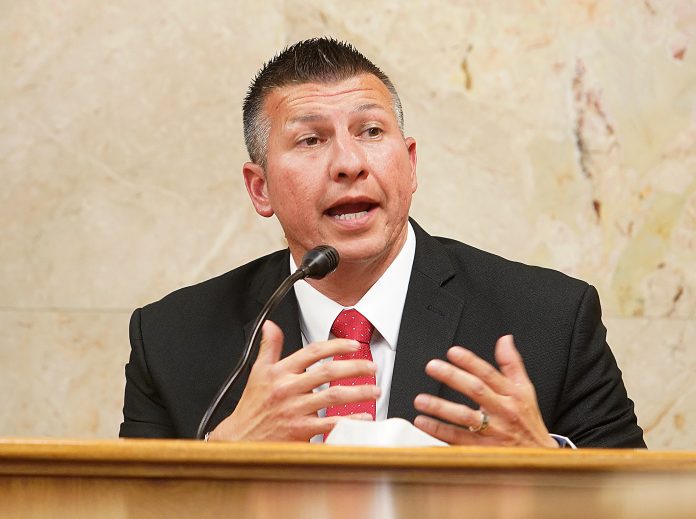
EDINBURG — A week after the jury first began hearing testimony, the defense rested its case in the trial for former Edinburg Mayor Richard Molina.
Molina was the last witness for the defense team and concluded his testimony Tuesday after more than a day of questions from his own defense team and the prosecution.
While being questioned by his attorney, Carlos A. Garcia, Molina said he never coerced, forced or bribed anyone into illegally voting for him during the 2017 mayoral election.
Multiple witnesses testified earlier during the trial that Molina told them to change their addresses so that they could vote for him.
Molina admitted to telling friends, family and other supporters to change their address so they could vote during the election but he said they wanted to vote for him and said he believed what they were doing was legal.
He said he based this belief off of training he took with the Hidalgo County Elections Department to become a volunteer deputy voter registrar and from information he researched on the Texas Secretary of State’s website.
From his readings, he said he understood that residence was a choice, that people couldn’t be told how to vote and what address they could use.
“I also learned that there was also a lot of factors to determine residency,” Molina said. He agreed with Garcia that those factors included where they worked, where they owned businesses, where they wanted to exercise their civil or political rights, where a person pays taxes, and where a person owns real or personal property.
Prosecutor Michael Garza asked Molina if he thought people from McAllen should be able to vote in Edinburg, Molina said if they only come to the city once, then they should not be allowed to vote here.
“Anywhere they go and spend time there, they can vote in that jurisdiction, that’s the law according to you, sir?” Garza asked.
“Yes, according to me, they get to decide whether they want to vote from, as long as they vote from one place,” Molina said.
He also said that changing addresses to vote in an election was a common practice in the city among other political factions and that it only became an issue when he became mayor.
Asked if he had any regrets, Molina said he regretted that his friends, family and supporters were attacked.
He also said he regretted telling them that they could change their address to vote, saying they were threatened to be arrested, some were threatened with losing their jobs, and some were threatened with being locked up.
“I regret it because they used this as a political ploy to get me out of office because they didn’t want me to be the mayor,” Molina said, referring to his eventual election loss in 2021.
He added he believed he lost the election because of the “negative threats” and people seeing him and his wife being “paraded around in handcuffs.”
Calling on Molina’s experience as a police officer, Garza asked if he caught someone speeding or otherwise breaking the law, was it a valid excuse to say that other people were doing it too?
Molina acknowledged it was not a valid excuse.
“How about ‘Well I read something that said that if you’re going less than 10% over the speeding limit that it’s not a crime?'” Garza said.
Molina said that was not a valid excuse either.
Later under re-direct questioning from Garcia, Molina said their argument in this case is not that their actions were OK because other people were doing it too. He said his argument is that he understood the law to be a certain way.
“Because in your mind, it was reasonable because that must explain why everyone does it, is that your understanding?” Garcia said.
“That’s correct,” Molina said.
Molina maintained that he and his supporters did not do anything wrong and alleged that those who testified against him in the trial did it under the threat of being arrested.
“They didn’t have a choice, they had to testify otherwise they were going to get arrested,” Molina later said under questioning from Garcia.
Presenting a chart of the alleged scheme with the names of people who changed their address to vote in the 2017 election, Garza, the state prosecutor, asked Molina if there were others, not on the chart, whom he told they could change their address. Molina said he didn’t know.
After the defense rested their case, the trial recessed for the day but will resume Wednesday afternoon when they will be presented with the charge and the attorneys will have an opportunity to make their closing arguments.
To see more of Day 6 of Richard Molina’s trial, view Monitor photojournalist Joel Martinez’s full photo gallery here:
PREVIOUS COVERAGE:
>> Day 1 (Photo Gallery)
>> Day 2 (Photo Gallery)
>> Day 3 (Photo Gallery)
>> Day 4
>> Day 5 (Photo Gallery)




